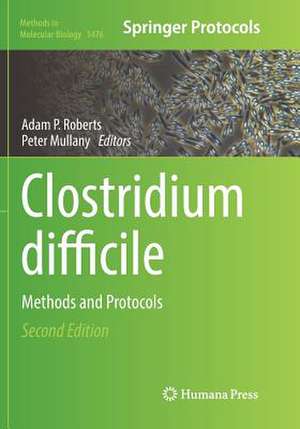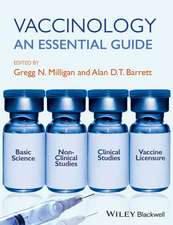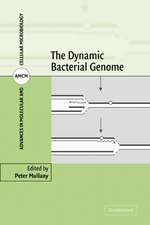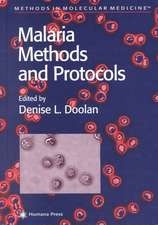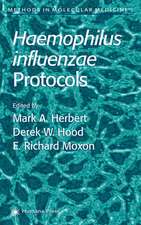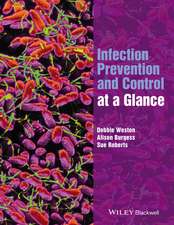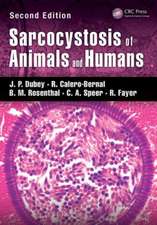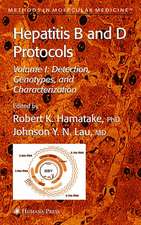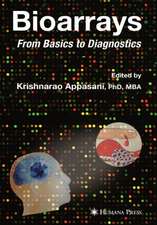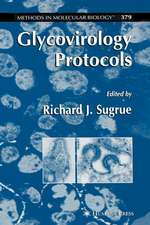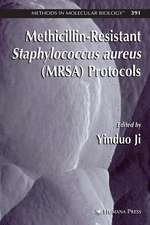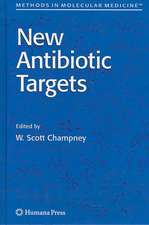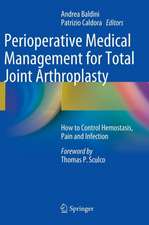Clostridium difficile: Methods and Protocols: Methods in Molecular Biology, cartea 1476
Editat de Adam P. Roberts, Peter Mullanyen Limba Engleză Paperback – 9 iun 2018
Authoritative and cutting-edge, Clostridium difficile: Methods and Protocols, Second Edition provides a comprehensive catalogue of molecular tools and techniques authored by the researchers who have developed them.
| Toate formatele și edițiile | Preț | Express |
|---|---|---|
| Paperback (2) | 720.47 lei 6-8 săpt. | |
| Springer – 9 iun 2018 | 720.47 lei 6-8 săpt. | |
| Humana Press Inc. – 23 aug 2016 | 891.02 lei 6-8 săpt. | |
| Hardback (2) | 648.89 lei 6-8 săpt. | |
| Humana Press Inc. – 8 iun 2010 | 648.89 lei 6-8 săpt. | |
| Springer – 10 aug 2016 | 729.06 lei 6-8 săpt. |
Din seria Methods in Molecular Biology
- 9%
 Preț: 791.63 lei
Preț: 791.63 lei - 23%
 Preț: 598.58 lei
Preț: 598.58 lei - 20%
 Preț: 882.98 lei
Preț: 882.98 lei -
 Preț: 252.05 lei
Preț: 252.05 lei - 5%
 Preț: 802.70 lei
Preț: 802.70 lei - 5%
 Preț: 729.61 lei
Preț: 729.61 lei - 5%
 Preț: 731.43 lei
Preț: 731.43 lei - 5%
 Preț: 741.30 lei
Preț: 741.30 lei - 5%
 Preț: 747.16 lei
Preț: 747.16 lei - 15%
 Preț: 663.45 lei
Preț: 663.45 lei - 18%
 Preț: 1025.34 lei
Preț: 1025.34 lei - 5%
 Preț: 734.57 lei
Preț: 734.57 lei - 18%
 Preț: 914.20 lei
Preț: 914.20 lei - 15%
 Preț: 664.61 lei
Preț: 664.61 lei - 15%
 Preț: 654.12 lei
Preț: 654.12 lei - 18%
 Preț: 1414.74 lei
Preț: 1414.74 lei - 5%
 Preț: 742.60 lei
Preț: 742.60 lei - 20%
 Preț: 821.65 lei
Preț: 821.65 lei - 18%
 Preț: 972.30 lei
Preț: 972.30 lei - 15%
 Preț: 660.49 lei
Preț: 660.49 lei - 5%
 Preț: 738.41 lei
Preț: 738.41 lei - 18%
 Preț: 984.92 lei
Preț: 984.92 lei - 5%
 Preț: 733.29 lei
Preț: 733.29 lei -
 Preț: 392.60 lei
Preț: 392.60 lei - 5%
 Preț: 746.26 lei
Preț: 746.26 lei - 18%
 Preț: 962.66 lei
Preț: 962.66 lei - 23%
 Preț: 860.22 lei
Preț: 860.22 lei - 15%
 Preț: 652.64 lei
Preț: 652.64 lei - 5%
 Preț: 1055.50 lei
Preț: 1055.50 lei - 23%
 Preț: 883.87 lei
Preț: 883.87 lei - 5%
 Preț: 1141.13 lei
Preț: 1141.13 lei - 19%
 Preț: 491.89 lei
Preț: 491.89 lei - 5%
 Preț: 1038.86 lei
Preț: 1038.86 lei - 5%
 Preț: 524.16 lei
Preț: 524.16 lei - 18%
 Preț: 2122.34 lei
Preț: 2122.34 lei - 5%
 Preț: 1299.23 lei
Preț: 1299.23 lei - 5%
 Preț: 1339.12 lei
Preț: 1339.12 lei - 18%
 Preț: 1390.26 lei
Preț: 1390.26 lei - 18%
 Preț: 1395.63 lei
Preț: 1395.63 lei - 18%
 Preț: 1129.65 lei
Preț: 1129.65 lei - 18%
 Preț: 1408.26 lei
Preț: 1408.26 lei - 18%
 Preț: 1124.92 lei
Preț: 1124.92 lei - 18%
 Preț: 966.27 lei
Preț: 966.27 lei - 5%
 Preț: 1299.99 lei
Preț: 1299.99 lei - 5%
 Preț: 1108.51 lei
Preț: 1108.51 lei - 5%
 Preț: 983.76 lei
Preț: 983.76 lei - 5%
 Preț: 728.16 lei
Preț: 728.16 lei - 18%
 Preț: 1118.62 lei
Preț: 1118.62 lei - 18%
 Preț: 955.25 lei
Preț: 955.25 lei - 5%
 Preț: 1035.62 lei
Preț: 1035.62 lei
Preț: 720.47 lei
Preț vechi: 758.38 lei
-5% Nou
Puncte Express: 1081
Preț estimativ în valută:
137.88€ • 149.72$ • 115.82£
137.88€ • 149.72$ • 115.82£
Carte tipărită la comandă
Livrare economică 23 aprilie-07 mai
Preluare comenzi: 021 569.72.76
Specificații
ISBN-13: 9781493981762
ISBN-10: 1493981765
Pagini: 292
Ilustrații: XI, 292 p. 49 illus., 33 illus. in color.
Dimensiuni: 178 x 254 mm
Greutate: 0.54 kg
Ediția:Softcover reprint of the original 2nd ed. 2016
Editura: Springer
Colecția Humana
Seria Methods in Molecular Biology
Locul publicării:New York, NY, United States
ISBN-10: 1493981765
Pagini: 292
Ilustrații: XI, 292 p. 49 illus., 33 illus. in color.
Dimensiuni: 178 x 254 mm
Greutate: 0.54 kg
Ediția:Softcover reprint of the original 2nd ed. 2016
Editura: Springer
Colecția Humana
Seria Methods in Molecular Biology
Locul publicării:New York, NY, United States
Cuprins
Restriction Endonuclease Analysis Typing of Clostridium Difficile Isolates.- Direct PCR-ribotyping of Clostridium difficile.- From FASTQ to Function: In silico Methods for Processing Next Generation Sequencing Data.- Clostridium difficile Genome Editing Using pyrE Alleles.- Use of mCherryOpt Fluorescent Protein in Clostridium difficile.- A Fluorescent Reporter for Single Cell Analysis of Gene Expression in Clostridium difficile.- Clostridium difficile Adhesins.- Intestinal Epithelial Cell Response to Clostridium difficile Flagella.- Isolating and Purifying Clostridium difficile Spores.- Inducing and Quantifying Clostridium difficile Spore Formation.- Characterization of Functional Prophages in Clostridium difficile.- Induction and Purification of C. difficile Phage Tail-like Particles.- Phage Transduction.- Transfer of Clostridium difficile Genetic Elements Conferring Resistance to Macrolide-Lincosamide-streptograminB (MLSB) Antibiotics.- Methods for Determining Transfer of Mobile Genetic Elements in Clostridium difficile.- Investigating Transfer of Large Chromosomal Regions Containing the Pathogenicity Locus between Clostridium difficile Strains.- An in vitro Model of the Human Colon: Studies of Intestinal Biofilms and lostridium difficile Infection.- MiniBioReactor Arrays (MBRAs) as a Tool for Studying C. difficile Physiology in the Presence of a Complex Community.- A Practical Method for Preparation of Fecal Microbiota Transplantation.- Ion Exchange Chromatography to Analyze Components of a Clostridium difficile Vaccine.- A Size Exclusion Chromatography Method for Analysis of Clostridium difficile Vaccine Toxins.
Textul de pe ultima copertă
This second edition provides 21 new chapters on methods used in laboratories for investigating the physiology and molecular genetics of the pathogen Clostridium difficile. Chapters detail up-to -date experimental techniques for gene editing and transcriptional analysis which are used to investigate the fundamental biology of the organism and its virulence factors. Additional chapters describe development of potential new treatments including vaccines, bacteriophage and faecal transplantation. Written in the highly successful Methods in Molecular Biology series format, chapters include introductions to their respective topics, lists of the necessary materials and reagents, step-by-step, readily reproducible laboratory protocols, and tips on troubleshooting and avoiding known pitfalls.
Authoritative and cutting-edge, Clostridium difficile: Methods and Protocols, Second Edition provides a comprehensivecatalogue of molecular tools and techniques authored by the researchers who have developed them.
Authoritative and cutting-edge, Clostridium difficile: Methods and Protocols, Second Edition provides a comprehensivecatalogue of molecular tools and techniques authored by the researchers who have developed them.
Caracteristici
Includes cutting-edge methods and protocols Provides step-by-step detail essential for reproducible results Contains key notes and implementation advice from the experts Includes supplementary material: sn.pub/extras
Recenzii
From the reviews:
“This book describes a variety of research methods used to investigate the pathogenic properties of Clostridium difficile, a major nosocomial pathogen that causes a severe diarrhea after prolonged antibiotic treatment. … This book would be useful to scientists working with bacteria such as C. difficile that cause toxin-mediated diseases in the colon of their host. … This is a technical book that provides essential methods and techniques to study devastating diseases due to Clostridium difficile.” (Rebecca T. Horvat, Doody’s Review Service, October, 2010)
“This book describes a variety of research methods used to investigate the pathogenic properties of Clostridium difficile, a major nosocomial pathogen that causes a severe diarrhea after prolonged antibiotic treatment. … This book would be useful to scientists working with bacteria such as C. difficile that cause toxin-mediated diseases in the colon of their host. … This is a technical book that provides essential methods and techniques to study devastating diseases due to Clostridium difficile.” (Rebecca T. Horvat, Doody’s Review Service, October, 2010)
